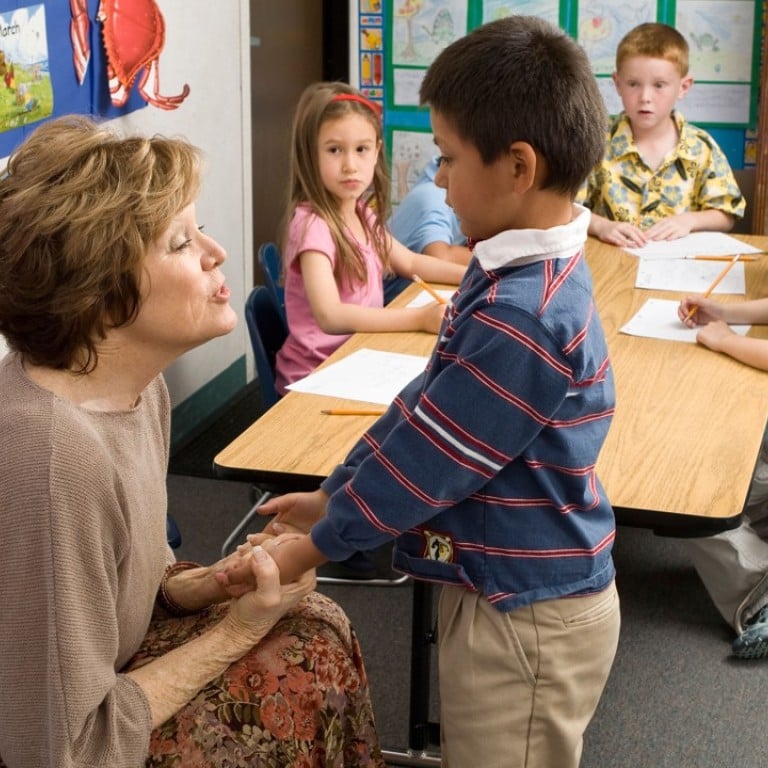
Hong Kong parent appalled by bad behaviour at son’s school
Schools vary in their approach and response to instilling discipline, and parents are advised to visit to get a sense of how the students interact and behave before choosing a school for their children
A Hong Kong parent writes: I rarely go in to my son’s primary school but I took a day off work recently to help on a school trip and was appalled by the general behaviour. I was shocked to find children pushing each other on the stairs, running along the corridors screaming and shouting. One child almost knocked me over without even an apology. My son’s teacher seemed to be able to control the children in the classroom during the briefing but I was not at all impressed with the school as a whole.
Styles of disciplining students have changed since some of us were at school. However, even with the use of modern, more liberal methods, this is not an excuse for the unacceptable behaviour you have just described.
Standards of discipline and the expectation of, and insistence upon, good manners are certainly not just down to individual teachers within their own classrooms. It is a matter for the whole school and its leadership team to set and constantly reinforce high expectations and monitor them continuously in whatever context teachers and students find themselves in.
Children learn best in a secure and safe environment. This gives them the best chance to reach their full potential. Effective discipline and an ethos of mutual respect between all adults and pupils is key to a calm, happy and successful school.
This also includes the way that pupils interact with the school caretaker, office staff members or educational assistants who supervise playground duty, not just the teaching staff.
Should schools ban vending machines, asks Hong Kong parent worried about daughter’s snacking
Even in a good school, it’s amazing how quickly school corridors can turn into a frenzy of running, pushing and shouting if important rules are not reinforced in assemblies and classrooms. Children are children, and they benefit from numerous reminders and positive reinforcement.
Having said this, however, an effective school policy in this regard has at its core pupils’ responsibility for their own behaviour with the aim to learn from and reflect on any mistakes or bad choices they might make. Students usually respond positively to being given high expectations of behaviour and good manners.

Schools vary in their approach and response to instilling discipline. Philosophies range from a more liberal stance based on encouragement and positive reinforcement to a more draconian regime based on punishment.
This does not mean that appropriate sanctions should not be available to teachers and others. Actions have consequences and learning this is a valuable life lesson for students of any age.
Before choosing a school, parents should visit during school hours so they can get a real sense of the standards of behaviour within the establishment. For example, do pupils hold doors open for each other and move around the school in a civilised manner? Are they generally polite and communicative?
You would be amazed that the experience of visiting a school for even a short time, as you have, can give a real feel of how responsibly the students behave and how the teachers interact with them. Trust your instincts.
Why no nursery rhymes at Hong Kong kindergarten? They’re a great way of learning to read and spell – and have some fun
Parents should look for how positive behaviour is rewarded by incentives that appeal to students such as house points or stickers and check the consequences pupils face if they misbehave or break the rules.
Are they simply told off with no follow through or encouraged to reflect on their actions in a meaningful way, including a plan on how to react more appropriately in future? Punishments are not necessarily a bad thing and students need to know that they may well lose privileges or miss out on something they were looking forward to.
Although behaviour problems in Hong Kong schools are often not as extreme as in some other countries – there are rarely reports of chairs flying through windows or teachers being sworn at or physically assaulted – a good school will take the health and safety of its students seriously.
Your son’s school should be more than willing to talk with you about your concerns. They may even value information you give them in order to adapt what they currently do.
Julie McGuire is a former Hong Kong primary-school teacher
